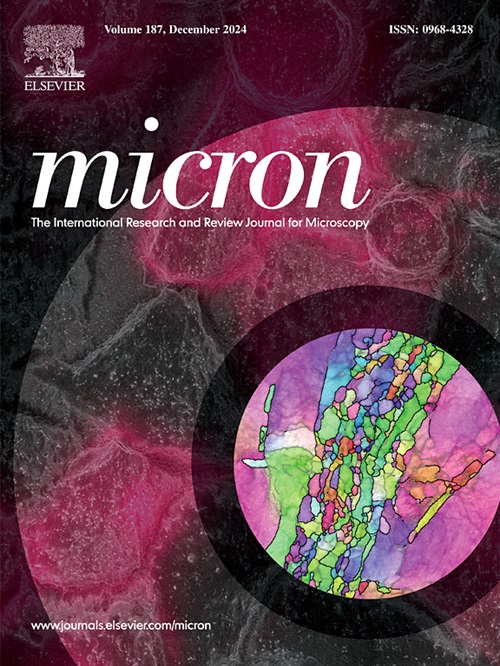On the effect of precession for magnetic differential phase contrast imaging
IF 2.2
3区 工程技术
Q1 MICROSCOPY
引用次数: 0
Abstract
The separation of diffraction effects from phase contrast is a major challenge for differential phase contrast (DPC) imaging in scanning transmission electron microscopy (STEM). The application of electron beam precession has previously been proven successful in homogenizing the direct beam and improving the imaging of both long-range electric and magnetic fields. However, magnetic STEM-DPC imaging performed in a low magnification (LM) STEM mode suffers from significant aberrations of the probe forming lens and the consequent impediment of small precession angles. By investigating the application of precession path segmentation to LM-STEM precessed scans for the imaging of LSMO and FeAl thin film samples, the initially reported benefits of precession were discovered to be less substantial than originally assumed. The segmentation methodology reveals that precession induced beam phase shifts account for a large part of the DPC induction profile smoothing, and the precession path is non-circular, leading to streaking artifacts in the reconstructed induction maps.
旋进对磁差相衬成像的影响。
从相衬中分离衍射效应是扫描透射电子显微镜(STEM)中差分相衬(DPC)成像的一大挑战。电子束前冲的应用已被证明能成功地使直接光束均匀化,并改善长程电场和磁场的成像。然而,在低放大倍率(LM)STEM 模式下进行的磁性 STEM-DPC 成像会受到探针成型透镜的严重畸变以及随之而来的小前驱角的阻碍。通过研究前冲路径分割在 LM-STEM 前冲扫描中的应用,对 LSMO 和 FeAl 薄膜样品进行成像,发现最初报告的前冲优势并没有最初假设的那么大。分割方法显示,前冲引起的光束相移占 DPC 感应曲线平滑的很大一部分,而且前冲路径是非圆形的,导致重建的感应图中出现条纹假象。
本文章由计算机程序翻译,如有差异,请以英文原文为准。
求助全文
约1分钟内获得全文
求助全文
来源期刊

Micron
工程技术-显微镜技术
CiteScore
4.30
自引率
4.20%
发文量
100
审稿时长
31 days
期刊介绍:
Micron is an interdisciplinary forum for all work that involves new applications of microscopy or where advanced microscopy plays a central role. The journal will publish on the design, methods, application, practice or theory of microscopy and microanalysis, including reports on optical, electron-beam, X-ray microtomography, and scanning-probe systems. It also aims at the regular publication of review papers, short communications, as well as thematic issues on contemporary developments in microscopy and microanalysis. The journal embraces original research in which microscopy has contributed significantly to knowledge in biology, life science, nanoscience and nanotechnology, materials science and engineering.
 求助内容:
求助内容: 应助结果提醒方式:
应助结果提醒方式:


